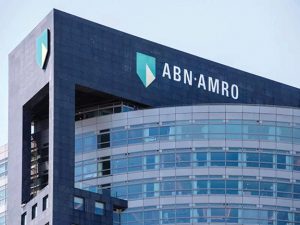Bloomberg
ABN Amro Bank NV said it will start a 500 million-euro share buyback ($571 million) after fourth quarter profit jumped, joining European peers in pledging higher returns as the industry rebounds from the pandemic.
Net income soared to 552 million euros in the period, exceeding the 426 million euros that analysts surveyed by Bloomberg had expected on average, boosted by fee income and the sale of the bank’s head office. Provisions for loan losses fell to 121 million euros from 220 million euros.
European banks are taking a rosier view of the prospects of borrowers as economies reopen with companies weathering the worst of the pandemic thanks to taxpayer support. That has bolstered the bottom line at lenders, allowing them to return billions of euros to shareholders via dividends and share buybacks.
The Amsterdam-based lender joins a raft of European peers from UBS Group AG to Intesa Sanpaolo SpA and Banco Bilbao Vizcaya Argentaria SA in Spain which have announced share repurchase plans on rising profit and
excess capital.
The Dutch state, which holds 56.3% of ABN Amro after a financial crisis-era bailout, said it will take part in the buyback and receive about 281 million euros. It said that it’s stake will remain unchanged.
ABN Amro Chief Executive Officer Robert Swaak said the fact that the bank was able to boost its capital ratios last year “gave us confidence to release additional capital to shareholders.â€
The bank’s common equity Tier 1 ratio, its key measure of financial strength, stood at 16.3% at the end of December. That’s one of the highest levels at European banks. That’s after the deduction of the funds for the buyback, ABN Amro said. The purchases will start on Thursday and be completed by June at the latest.
Fellow Dutch lender ING Groep NV took a more conservative approach than many European banks in the fourth quarter by setting aside more credit provisions than expected as new risks emerge. Supply chain disruptions and a spike in inflation are posing a threat to the ability of weaker companies and consumers alike to repay their debts, according to the bank.
ABN Amro said it has now “largely completed†the winding down of large parts of its investment bank activities to focus on retail and commercial banking.
The Dutch lender is more reliant on lending income because it lacks the large trading operations that several European competitors have. That’s been a problem in recent years as negative interest rates eat into its earnings.
Net interest income fell 1% to 1.34 billion euros in the fourth quarter from a year earlier. The bank is passing on the cost of negative interest rates to a wider section of clients, lowering the threshold this year for charges to deposits over 100,000 euros from 150,000 euros in the fourth quarter.
Lending revenue was also hit by a 91 million euro provision for compensating consumer clients after the bank was found to have overcharged them on loans with floating interest rates. That scandal, which affected several Dutch lenders, was a setback for the industry as it seeks to rebuild its reputation after the financial crisis and a series of missteps in subsequent years.
 The Gulf Time Newspaper One of the finest business newspapers in the UAE brought to you by our professional writers and editors.
The Gulf Time Newspaper One of the finest business newspapers in the UAE brought to you by our professional writers and editors.
